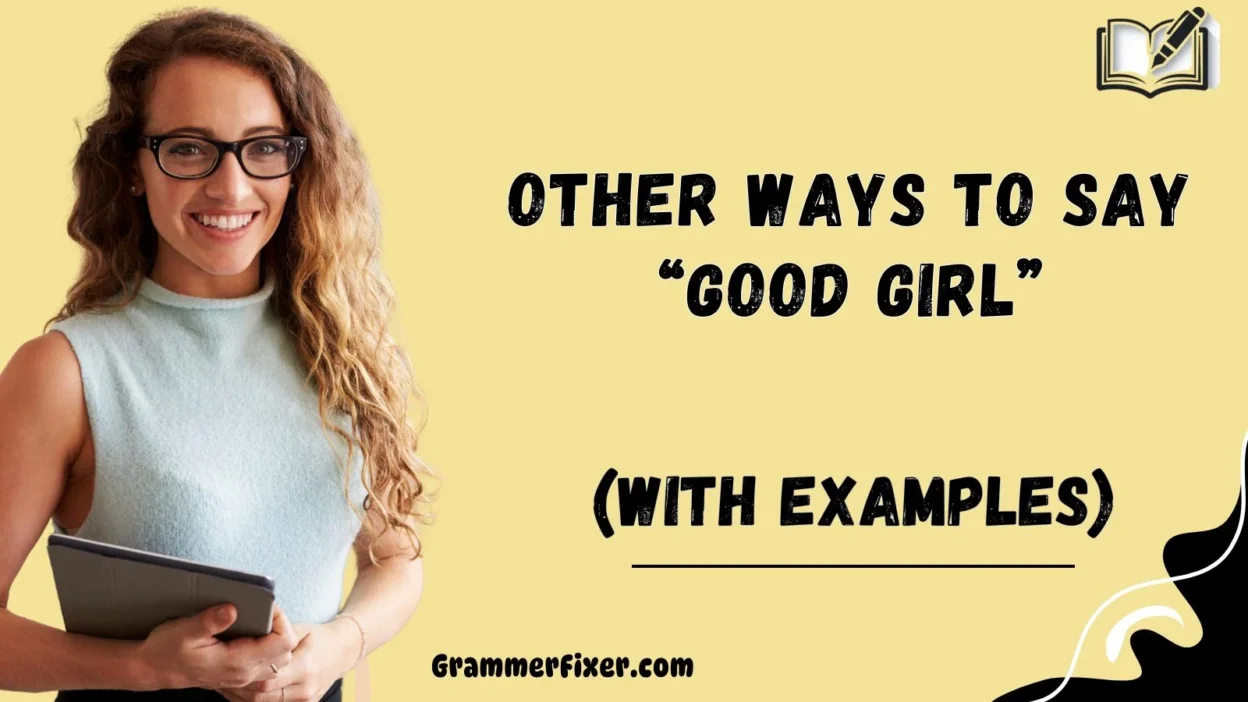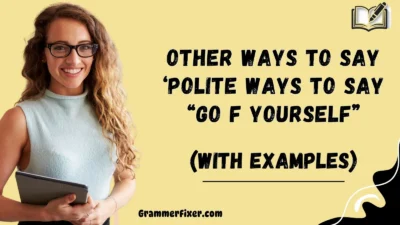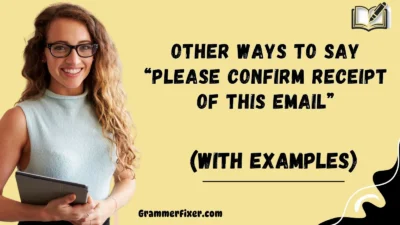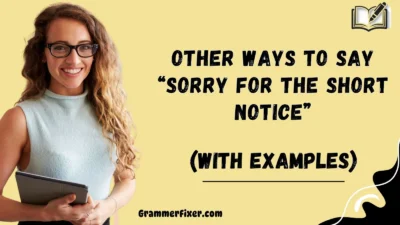Finding the right words to show appreciation, encouragement, or admiration is more powerful than we often realize. While the phrase “Good Girl” has traditionally been used to praise children, pets, or even affectionately toward loved ones, it can sometimes carry patronizing or limiting undertones—especially in professional or adult contexts.
This article explores 30 thoughtful alternatives you can use to express warmth, respect, and encouragement in ways that feel more personal, uplifting, and empowering.
What Does “Good Girl” Mean?
The phrase “Good Girl” is commonly used as an expression of praise or approval, often directed toward a child, pet, or loved one. It acknowledges that the person (or animal) has behaved well, followed instructions, or achieved something desirable.
At its core, it’s meant to communicate encouragement and recognition. However, depending on the context, it may also come across as infantilizing or condescending, especially when used with adults.
When to Use “Good Girl”?
- Appropriate Contexts: With young children, when teaching manners, praising efforts, or encouraging self-esteem; with pets, to reinforce positive behavior; or in informal, affectionate settings with close loved ones who welcome such phrasing.
- Cautionary Contexts: Avoid in professional, formal, or adult relationships where the phrase might feel diminishing, gendered, or disrespectful.
Is It Professional/Polite to Say “Good Girl”?
Generally, no. In professional or adult contexts, “Good Girl” may be interpreted as patronizing, sexist, or infantilizing. Instead, using respectful, specific praise (e.g., “Great job on the project” or “You handled that challenge with skill”) conveys the same encouragement without undermining maturity or autonomy.
In casual or affectionate contexts (like with children, pets, or close family), it can still be warm and supportive.
Pros or Cons of Saying “Good Girl”
Pros:
- Offers quick, positive reinforcement.
- Can be encouraging for children or pets.
- Expresses warmth and approval in affectionate settings.
Cons:
- Risks sounding patronizing toward adults.
- May reinforce gender stereotypes.
- Lacks specificity, making praise less meaningful.
1. Well Done
Meaning: Recognition of a completed task or achievement.
Explanation: A universal, respectful phrase acknowledging success.
Scenario Example: “Well done on finishing your essay—it was clear and thoughtful.”
Best Use: Professional, academic, or casual praise.
Worst Use: When the achievement is very personal or emotional (e.g., comforting a friend after a breakup) where empathy matters more than performance-based praise.
Tone: Encouraging, respectful.
2. Great Job
Meaning: Direct praise for effort and results.
Explanation: More casual than “Well done,” but still affirming.
Scenario Example: “Great job on your presentation, Alex!”
Best Use: Work, school, teamwork.
Worst Use: When addressing a sensitive failure or setback; could come across as dismissive if used sarcastically.
Tone: Supportive, enthusiastic.
3. I’m Proud of You
Meaning: Expresses genuine pride.
Explanation: Goes beyond performance and validates the person.
Scenario Example: “I’m proud of you for being patient with the client.”
Best Use: Personal, family, mentorship.
Worst Use: In formal or workplace contexts where it might sound condescending if coming from a manager to an adult colleague.
Tone: Warm, heartfelt.
4. You Did Amazing
Meaning: Strong compliment on performance.
Explanation: Highlights excellence without formality.
Scenario Example: “You did amazing in the team huddle today!”
Best Use: Casual, supportive.
Worst Use: Overused or exaggerated in professional settings, where specific feedback is more valuable than generic hype.
Tone: Enthusiastic, uplifting.
5. Keep It Up
Meaning: Encouragement for continued success.
Explanation: Suggests consistency and perseverance.
Scenario Example: “You’re doing great with your training—keep it up!”
Best Use: Sports, work progress, learning.
Worst Use: In emotional or vulnerable contexts—e.g., someone struggling mentally—where encouragement may feel dismissive of deeper struggles.
Tone: Motivational.
6. You’re So Helpful
Meaning: Recognizes someone’s positive contribution.
Explanation: This phrase highlights the specific action of being supportive or dependable, showing appreciation for the effort.
Scenario Example: “You’re so helpful when you organize the team’s files—it saves everyone time.”
Best Use: Workplace teamwork, family chores, or when acknowledging small but important acts.
Worst Use: When used vaguely without specifics—it can sound insincere if the person doesn’t know what they were helpful with.
Tone: Appreciative, affirming.
7. That Was a Great Effort
Meaning: Acknowledges persistence and energy put into something.
Explanation: Focuses on the learning process rather than just the outcome, reinforcing growth.
Scenario Example: “That was a great effort in your piano practice—you’re improving every day.”
Best Use: With children, learners, or anyone working to build a skill.
Worst Use: In high-pressure, results-driven situations (e.g., failed project with big stakes), where effort praise may feel dismissive of actual goals.
Tone: Encouraging, growth-oriented.
8. You’re a Treasure
Meaning: Expresses that someone is highly valued.
Explanation: Goes beyond performance—it speaks to the person’s overall worth and importance.
Scenario Example: “You’re a treasure to this team—your kindness makes a difference.”
Best Use: Personal relationships, friendships, mentorship.
Worst Use: Professional settings with colleagues or clients, where it could feel overly sentimental or unprofessional.
Tone: Heartfelt, affectionate.
9. Wonderful Work
Meaning: A strong, positive term of praise.
Explanation: Straightforward recognition of excellence in what someone has done.
Scenario Example: “That was wonderful work on the quarterly report—your attention to detail was impressive.”
Best Use: Professional recognition, academic feedback, or creative achievements.
Worst Use: In casual or personal relationships where the phrase may feel too formal or detached.
Tone: Respectful, admiring.
10. Brilliant
Meaning: A short, powerful word for excellence.
Explanation: Commonly used in British English to convey admiration for a clever action, idea, or achievement.
Scenario Example: “That’s a brilliant solution to the client’s issue!”
Best Use: Workplaces, academic achievements, or clever problem-solving.
Worst Use: Overused casually (e.g., responding to everything as “brilliant”), which can reduce sincerity.
Tone: Enthusiastic, intelligent.
11. Excellent
Meaning: Clear and direct acknowledgment of good performance.
Explanation: Professional yet warm, it communicates approval without sounding over the top.
Scenario Example: “Your report was excellent—well researched and clearly written.”
Best Use: Professional, academic, or mentoring contexts.
Worst Use: Personal or intimate relationships where “excellent” may feel too stiff and detached.
Tone: Formal, appreciative.
12. Strong Work
Meaning: Recognition of dependable, solid performance.
Explanation: Suggests reliability, effort, and results without unnecessary embellishment.
Scenario Example: “That was strong work under tight deadlines—you handled it well.”
Best Use: Workplace, project reviews, athletic coaching.
Worst Use: With children or sensitive learners; may sound cold or militaristic rather than encouraging.
Tone: Respectful, confident.
13. Very Fine
Meaning: A refined way of acknowledging excellence.
Explanation: More formal and elegant than “great job,” suited for situations that require a touch of sophistication.
Scenario Example: “That was a very fine presentation—your preparation showed.”
Best Use: Formal, academic, or artistic settings.
Worst Use: With kids or casual situations where it may feel outdated or too formal.
Tone: Polished, refined.
14. That’s Excellent
Meaning: Immediate acknowledgment of quality performance.
Explanation: Combines clarity and positivity in a short phrase.
Scenario Example: “That’s excellent work on organizing the schedule, Sarah.”
Best Use: Quick, professional praise.
Worst Use: Overused in group chats or casual contexts, where it may sound robotic.
Tone: Clear, professional.
15. You’re Doing Great
Meaning: Encouragement recognizing progress in the moment.
Explanation: Focuses on ongoing effort and motivates continuation.
Scenario Example: “You’re doing great in your training sessions—keep going!”
Best Use: Coaching, mentoring, personal encouragement.
Worst Use: During a failure or major setback—could come across as false reassurance if not paired with empathy.
Tone: Motivational, supportive.
16. Well-Behaved
Meaning: Recognition of proper behavior or manners.
Explanation: Highlights respectfulness and attentiveness to rules or norms.
Scenario Example: “You were very well-behaved during the visit to grandma’s.”
Best Use: Children, pets, or informal mentoring settings.
Worst Use: Adults in professional or personal contexts—it may feel patronizing.
Tone: Polite, approving.
17. Sweetheart
Meaning: Affectionate term for someone cherished.
Explanation: Conveys warmth and personal connection.
Scenario Example: “Thanks for helping me, sweetheart, I really appreciate it.”
Best Use: Close family, romantic partners, or affectionate friends.
Worst Use: Professional, formal, or casual acquaintances—it may feel inappropriate or overly intimate.
Tone: Warm, loving.
18. Angel
Meaning: Expresses admiration and endearment.
Explanation: Suggests someone is kind, helpful, or wonderful in nature.
Scenario Example: “You’re an angel for staying late to help me with the project.”
Best Use: Personal, informal, or affectionate settings.
Worst Use: Professional settings, could feel unprofessional or overly sentimental.
Tone: Affectionate, caring.
19. Darling
Meaning: Term of endearment conveying fondness.
Explanation: Communicates affection and approval.
Scenario Example: “Well done, darling! You handled that call perfectly.”
Best Use: Romantic partners, family, or close friends.
Worst Use: Professional or casual acquaintances—it can feel patronizing or inappropriate.
Tone: Warm, personal.
20. Golden
Meaning: Highlights exceptional quality or value.
Explanation: Metaphorical praise for something outstanding or treasured.
Scenario Example: “Your idea was golden—it solved the issue quickly.”
Best Use: Creative work, problem-solving, or personal achievements.
Worst Use: Overused in casual conversation—may feel exaggerated.
Tone: Admirative, positive.
21. Little Princess
Meaning: Affectionate nickname for a young girl.
Explanation: Conveys warmth, care, and cherished status.
Scenario Example: “Little princess, you did wonderfully on your recital.”
Best Use: Children in family or educational settings.
Worst Use: Adults—it can feel infantilizing or patronizing.
Tone: Loving, nurturing.
22. Lovely
Meaning: Complimenting charm, behavior, or effort.
Explanation: Highlights positive qualities in a gentle, appreciative way.
Scenario Example: “Lovely job finishing the project ahead of schedule.”
Best Use: Professional and personal contexts where warmth is appropriate.
Worst Use: Overly casual use in formal feedback—it may feel vague.
Tone: Warm, encouraging.
23. Brave
Meaning: Recognizes courage in action or decision-making.
Explanation: Focuses on strength, fearlessness, and facing challenges.
Scenario Example: “You were brave to speak up in the meeting—it made a difference.”
Best Use: Personal development, challenges, mentorship.
Worst Use: In trivial situations where bravery isn’t applicable—it may seem insincere.
Tone: Affirming, motivational.
24. Precious
Meaning: Highlights that someone is valued and cherished.
Explanation: Conveys affection, admiration, and importance.
Scenario Example: “You’re precious for helping everyone stay calm during the trip.”
Best Use: Children, close family, or intimate relationships.
Worst Use: Professional or adult contexts where it may feel patronizing.
Tone: Loving, caring.
25. Sunshine
Meaning: Suggests warmth, positivity, and joy someone brings.
Explanation: Praises personality and emotional impact, not just actions.
Scenario Example: “You’re sunshine—you really brightened everyone’s day in the meeting.”
Best Use: Informal, affectionate, friendly settings.
Worst Use: Formal workplace—it may feel unprofessional or overly familiar.
Tone: Cheerful, uplifting.
26. Well-Mannered
Meaning: Recognizes polite and respectful behavior.
Explanation: Highlights social etiquette and proper conduct.
Scenario Example: “You were well-mannered during the dinner—thank you for being considerate.”
Best Use: Children, educational, or formal family settings.
Worst Use: Adults in casual settings—it can feel critical or condescending.
Tone: Respectful, approving.
27. Sugarplum
Meaning: Affectionate nickname conveying sweetness and endearment.
Explanation: Fun, playful way to express fondness.
Scenario Example: “Sugarplum, your artwork is absolutely wonderful!”
Best Use: Children or playful, affectionate personal relationships.
Worst Use: Professional or adult contexts—it may feel inappropriate or patronizing.
Tone: Affectionate, playful.
28. Cutie Pie
Meaning: Highlights charm and endearing qualities.
Explanation: Focuses on lovable, cute behavior or achievement.
Scenario Example: “Cutie pie, you finished the puzzle all by yourself!”
Best Use: Children, pets, or very informal, affectionate contexts.
Worst Use: Adults or professional settings—it can feel belittling.
Tone: Playful, affectionate.
29. Shining Star
Meaning: Recognizes outstanding performance or talent.
Explanation: Metaphor for excellence, visibility, and impact.
Scenario Example: “You were a shining star during the presentation—you nailed every point.”
Best Use: Academic, professional, or informal praise for notable achievements.
Worst Use: Overused or used sarcastically—it loses impact.
Tone: Admirative, encouraging.
30. Rockstar
Meaning: Modern, energetic term for impressive performance.
Explanation: Suggests exceptional skill, effort, or confidence.
Scenario Example: “You handled that client call like a rockstar!”
Best Use: Casual workplace, team recognition, or informal praise.
Worst Use: Formal, traditional settings—it may feel unprofessional.
Tone: Fun, enthusiastic.
Conclusion
Using alternatives to “Good Girl” allows you to express appreciation, admiration, and encouragement in ways that are thoughtful, respectful, and empowering. Each phrase carries its own nuances, context, and tone, so choosing wisely ensures your praise feels sincere and meaningful.



